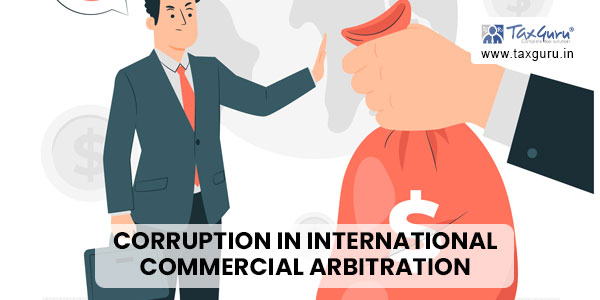Introduction
International commercial arbitration is a process by which parties to an international contract can resolve their disputes without having to go through the courts. However, corruption in this system has become a major concern in recent years. It is estimated that up to 10% of all international commercial arbitration cases involve some form of bribery or other corrupt activities.
Corruption in international commercial arbitration can have serious consequences for all parties involved, including the disputants, arbitrators and lawyers. It can lead to unfair outcomes, delays in proceedings and increased costs for all involved. This article will discuss the various forms of corruption that exist in international commercial arbitration along with its impact on public policy. Article will also explore the scope for improvement at various levels.
One form of corruption in international commercial arbitration is the practice of bribing parties to make a decision in favour of one party that would not otherwise be. In particular, the party being bribed may pay out large sums for an expert opinion or for information about their opponent’s case. The opponent will then often provide these items in return for the payment. This is a form of corruption that can have serious consequences, as it has been shown to lead to unfair outcomes and increased costs. Another form of corruption in international commercial arbitration is where arbitrators are able to influence or change the outcome or price by virtue of their status. This has been shown to be one of the leading causes for overturning awards in international arbitration. In order to avoid any potential corruption, the parties must ensure that they are aware of all possible risks and take necessary precautions when working with a third party or arbitrator. In commercial arbitration, this is done through proper disclosure and providing clear instructions on what information that needs to be shared with the arbitrator in order for them to conduct themselves properly as an impartial third party. This can be accomplished by ensuring that all necessary knowledge of your client documentation is provided to the arbitrator, along with a list of necessary party documentation to avoid any impartiality on part of the arbitrator.

Parties are sometimes involved in illegal dealings during commercial transactions. They may be desperate to maximize profits, secure contracts or perhaps perpetrate illegality. The illegality in such cases is not limited to parties only but in worst cases involves arbitrator, the institution, etc. making it a chain reaction. The involvement of governments and corruption are common features that often characterize international commercial transactions which sometimes result in disputes.
Corruption in Retention of Contracts
Perpetrating illegal acts during the retention or execution of contracts does not ipso facto mean that such contracts are illegal. If the contract is illegal, there is much less space for debate. An example is where the contract is to launder money. English case law offers a distinction between contracts that are illegal and contracts procured through illegality. In the case of the former, there will be no enforcement while in the case of the latter there is no requirement that English public policy should prevent enforcement. A failed attempt to bribe would also not taint the correct.
It is difficult to distinguish between corruption and other forms of misconduct, and secrecy makes it even harder. A person who indulges in it would almost never admit to it and would need to be confronted with the evidence in order to admit their actions. As a result, corrupt acts may be discovered later, and the instinct to question why it has only just surfaced may be weakened. In spite of the fact that ‘the public policy of discouraging international commercial corruption’ exists, it is not enough to prevent arbitrability. In many instances, the doctrine of separability ensures that arbitration is an option that remains available. Traditionally, public policy has guarded its territory with a greater jealousy due to its direct link to national law.
In the Iranian Oil Company, the Claimant alleged that the contract for gas supply was obtained through illegal means. This argument was rejected by the English High Court because the arbitral court examined the allegations in detail over a 30-day period, and the court concluded that the contract was not illegally procured. However, the claimant was unable to improve on the case made before the tribunal, even though the case reinforced the argument that English public policy does not prevent the enforcement of illegally procured contracts. Despite the claimant’s efforts to prove illegal procurement, the claimant was unable to produce some evidence requested by the tribunal. In the event that fresh evidence is presented, the outcome could be different. It is difficult to navigate this area because arbitral courts cannot completely abdicate public policy questions or even complex criminal law questions.
Effects of Corruption in Arbitration
The term corruption refers to a variety of acts that can be classified according to their forms. Among the categories of corruption are: petty corruption (small amounts of money paid for frequent transactions), administrative corruption (bribes to avoid taxes and regulations, or to win contracts), corporate corruption (in the private sector), and political corruption (in government and politics). The concept of systemic corruption applies to all levels of society, whereas grand corruption refers to corruption involving senior government officials, ministers, heads of state, or politicians. The use of bribery can result in improper influence in areas of business and government, like the media, judiciary, and criminal justice systems.
As a result of the variety of forms in which corruption can take place, it is not possible to find a unified definition of it. There are many different approaches to corruption across countries, further complicating matters. The reason for this is that corruption is treated differently in different countries. A country’s approach to what constitutes corruption will determine the outcome of awards before its national court for enforcement, for example. There is no definition of corruption in most anti-corruption laws, including those of the OECD, Council of Europe, and United Nations. These legal frameworks instead establish corrupt offenses. According to Transparency International, corruption is “the abuse of entrusted power for personal gain”.
Arbitration processes are subject to corruption, which has significant consequences. A contract that was based on corrupt activities is void. For instance, bribes paid to enter a country’s market. According to the tribunal in ICC Case 8891, “a contract that promotes or incites corruption of public officials is contrary to transnational public policy, and if it appears that this is the object of the consultancy contract, it is null and void.” The dispute resolution relies on a valid contract, which is the source of the dispute. In the case of a dispute between parties whose main contract is invalid, no ground exists for settlement. In light of the strong condemnation of corruption, as well as the negative impact it has on the arbitration process, it is important that such behaviour is dealt with appropriately. It is also important to protect the integrity of arbitration as a judicial institution by dealing with corruption at the tribunal. There is no precedent value to an arbitral award. However, arbitrators must engage against illegality within this institution given the importance of combating corruption. In this area of law, where there is little consensus as to what constitutes a breach of international public policy, an active role within the tribunal can be very beneficial.
Conclusion
The discussion above exposed the complexity of the corruption issue, which raises tensions between public policy matters in which it is difficult to find a balance. Fairness in the global marketplace requires the fight against corruption. The importance of good governance, ethics, and transparency cannot be overstated. It would no longer be useful to the business community if arbitration became a place for corruption. It is necessary to combat corruption with efficient means. There is no way it can be accepted within the arbitration process. To contribute to the anti-corruption battle, as well as to protect arbitration as a dispute resolution forum, sua sponte investigations of corruption have been justified based on public policy considerations, enforceability principles, and proper adjudication principles.
As a result of this examination, it can be concluded that an arbitrator can successfully conduct a sua sponte investigation. Nevertheless, clarifications in this area evidently should be investigated by the arbitrator, it needs to be properly articulated, i.e., by means of regulations or guidelines. There is a legitimate need to deliberate on this problem in the future, so at least some clarity can be created. needed. In recent years, there has been a trend towards sua sponte investigations. In order for the arbitration community to adopt the prevailing opinion of the various commentators that corruption.





